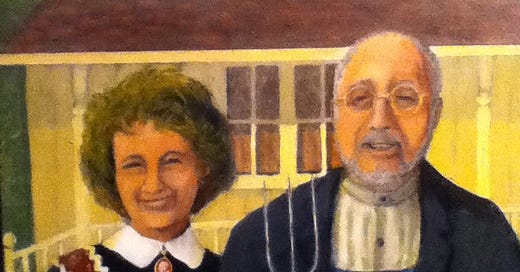Fern: God, I’d kill to be on that jury.
Joe: With an opening like that, I believe you’d be banned from serving on any jury for the rest of your life. I know what you’re talking about. Perhaps passion inflames your usually sound judgment.
Fern: I served on a jury once. I don’t know – over twenty years ago. I really wanted to get on. But I didn’t think I would be picked.
Joe: Why didn’t you think you’d be picked? Those lawyers didn’t even know you.
Fern: Very funny. I thought maybe I wouldn’t be picked because I have a New York accent. Or because I told them I was a writer and a university professor. That makes some people suspicious. You know, like I was looking for material.
It was a drunken driving case. Turns out that I was the only person interviewed who claimed I never drove drunk. I mean, not claimed: I never did drive drunk. Everyone else apparently had. Old ladies. Farmers. Real-estate agents. I was surprised at that. Did you ever drive drunk?
Joe: I was young once. And stupid. And lucky.
Fern: I thought it would be interesting to be on a jury. I’m in for new experiences -- as long is it doesn’t involve physical danger. Ultimately, we let the guy off even though most of us were pretty sure he was inebriated. The reason we didn’t convict was because he said he had a back injury from the accident; the police called an ambulance to the scene. No one did a sobriety test. We jurists discussed the case quite seriously. I was proud of the system. Being on a jury made me feel patriotic.
You’ve been called to jury duty next week. Are you looking forward to it?
Joe: Not really. I don’t mind serving again, but after my first taste of jury duty I have to admit that I don’t understand how judges can stand it. It was so bo-o-oring.
Fern: Boring? What do you mean boring? You were on the jury of a rape case.
Joe: That’s right, and I learned two very important things. One was that having to pay attention to every little detail was extremely tedious—even in a rape case. Lawyers repeat everything, everything, and they ask the same questions over and over as different witnesses take the stand.
Fern: So why didn’t you just close your eyes the way Trump does and take a little nap?
Joe: I could have, especially after the lunch break, but I wouldn’t. And that’s because of the feeling of responsibility I had. A young man’s life was in my hands, mine and the jury’s. Getting to know my fellow jurors over the two weeks of that trial, I discovered that people from all walks of life and orientation—gender, skin color, class, level of education and politics—all of us seemed to feel that same sense of responsibility, and it lifted us up together. We rose together. We sounded smarter, fairer, more decent than I ever would have guessed from just looking at us filing into the jury stand that first day. That was the second thing I learned, something I was pretty skeptical about before the trial: the jury system works.
Fern: Nicole Simpson and Ron Goldman might disagree.
Still, I would love to be on the Trump jury in New York now. I said I would kill to get on. You know I didn’t really mean that.
Joe: But you would probably lie to get on this jury, yes?
Fern: I would. Could you be impartial?
Joe: I can’t stand Trump, but yes, I think I could.
Fern: Probably you could. But I’m the one who actually wants to hear both sides. I listen to NPR at home and conservative talk-shows when I go somewhere and I’m alone in the car.
Joe: I know. When I drive your car, I can’t change channels fast enough.
Fern: So the other day, I’m listening to 1040, and it’s Buck or Travis somebody talking about picking a jury for the Trump trial in New York. One of the questions the lawyers asked the potential jurists is: “Where do you get news?” And someone answered: “MSNBC and Fox.” So Buck or Travis says: “Well, that’s an outright lie, nobody watches both MSNBC and Fox. “
Joe: But you do. So did you call in?
Fern: No. I was just yelling at them in the car.
But that’s what I’m saying. I listen to both sides. So maybe I could be unbiased.
Joe: I don’t think so.
Fern: They complained that Trump couldn’t get a fair trial in New York because he got less than twenty percent of the vote in that city.
Joe: Well, yes. New York voters are big city liberals, not the salt-of-the-earth regular people who were on your jury twenty years ago in Iowa.
Fern: Exactly. But what does it tell you about Trump? Running for president in his very own state and he was roundly romped. I think he lost all five boroughs getting less than a fourth of the vote.
In Manhattan it was less. Everyone in the Big Apple knew that this home-boy was a sleaze-bag, a crooked businessman, a lying braggart and a womanizer.
Stormy Daniels isn’t lying. And she wasn’t playing the victim either. Lots of women find themselves in compromising positions and think, “Ok, let’s just get this over with.”
The specifics of the pajamas he was wearing, the shape of his penis, the cheap stuff in his dopp kit -- it rings true because everything she said was so very specific.
It is particularly creepy that he compared Stormy Daniels to his daughter.
Joe: This is a trial about whether or not Trump intentionally falsified business documents in order to influence the 2016 election. We’ll know more after Michael Cohen testifies. But are all the salacious details really necessary to prove the case?
Fern: Maybe not. Yet I don’t recall anyone asking that question when newscasters were talking about presidential semen on a blue dress. Or what Bill Clinton actually did with that cigar.
Joe: So you think you could still have served impartially on the jury?
Fern: No. I would have had to lie to get on.
Joe: Bigly.






As I believe I heard from a lawyer discussing the case, it became important to get into the salacious details because Trump has denied it happened. The jury needed to know in spades that it did happen and the details became significant in the proof.
I’m with you, Fern. I would kill to be on that jury.